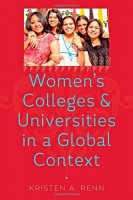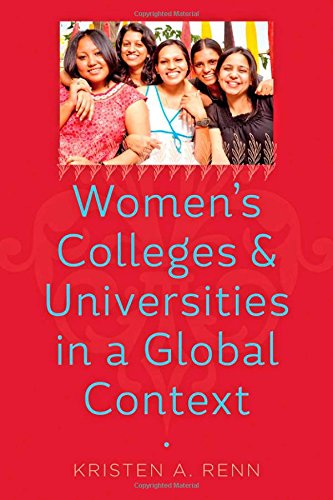 Author: Kristen A. Renn, PhD
Author: Kristen A. Renn, PhD
Publisher: Johns Hopkins University Press – 178 pages
Book Review by: Laxmi Chaandi
This book is based on on-site study of 13 women’s colleges and universities in 10 countries – Australia, Canada, China, India, Italy, Japan, Kenya, South Korea, the United Arab Emirates, and the United Kingdom. Those countries span the East and the West, and five continents, so its material is pretty much global in scope.
Ms. Renn did first- and second-hand research to produce this work. She interviewed campus leaders, members of the faculty, and students in these countries. She also searched archives and studied various resources on the Internet.
This book is unique in that it is a pioneering effort to study the effects of higher education of females upon populations. While the effects of such education varied in each country depending upon a host of factors (e.g. cultural, social, and religious beliefs), the overall outcome was overwhelmingly positive.
The main thesis of this book is that education (particularly higher education) of girls and women leads to improvement of societies worldwide. In particular, as women receive more education, the author reveals that these things happen:
- Infant death rates drop
- Literacy rates in children go up
- Women’s earning capacity rises
The contents of this book are organized into eight chapters, namely:
- The Context of Women’s Higher Education
- Exploring the World of Contemporary Women’s Colleges and Universities
- Providing Women Access to Higher Education
- Campus Climate: Being Ordinary is Not an Option
- Developing Student Leaders
- Gender Empowerment for Campus and Community
- Women’s Colleges and Universities as Symbols, Contradictions, and Paradoxes
- Raising Questions in the Present and about the Future
The author found that the levels of health, human rights, economic conditions, education, and political participation were higher in those areas where there was greater access to education for females.
In the area of health for example, she discovered that HIV rates were lower, and child nutrition was better. She found that women understand and act upon their legal rights in countries with open access to education. Women’s ability to get good jobs increased for those who completed college, and so did their involvement in the political process.
Kristen A. Renn is a professor of higher, adult, and lifelong education at Michigan State University as well as Associate Dean of Undergraduate Studies, and director for student success initiatives. Prior to becoming a faculty member, she was a dean in the Office of Student Life in Brown University. She holds a bachelor’s degree from Mount Holyoke College, a master’s from Boston University, and a PhD from Boston College.
She is the author of Mixed Race Students in College: The Ecology of Race, Identity and Community on Campus and the coauthor of College Students in the United States: Characteristics, Experiences, and Outcomes.
Her research focuses on college student learning and development, with an emphasis on diversity and equity in higher education. She studies women in higher education in United States and global contexts and has published extensively on mixed-race college students and bisexual, gay, lesbian, and transgender students in the U.S.
She is an associate editor for international research and scholarship for the Journal of Student Development and serves on editorial boards for the American Educational Research Journal and the Journal of Diversity in Higher Education.







